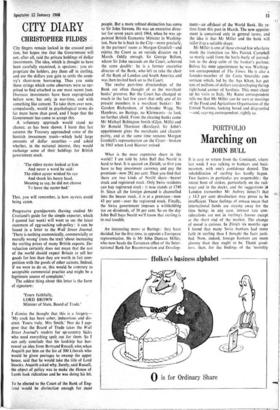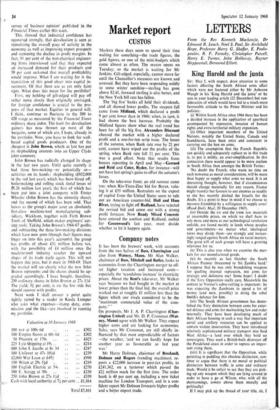Marching on
PORTFOLIO JOHN BULL
It is easy to return from the Continent, where last week I was talking to bankers and busi- nessmen, with one's confidence dented. The rehabilitation of sterling has hardly begun. Two factors in particular are responsible: the recent bout of strikes, particularly on the rail- ways and in the docks, and the suggestions ill London (remember Mr Aubrey Jones?) that a 14.3 per cent devaluation may prove to be insufficient. These feelings of unease mean that international funds are staying away for the time being; in any case, interest rate con- siderations are not in sterling's favour except at the short end of the market. The change of mood is curious. In ZUrich six months ago I found that many Swiss bankers had more faith in sterling than I thought the facts justi- fied. Now, indeed, foreign bankers are more gloomy than they ought to be. Thank good- ness, then, for the findings of the 'monthly survey of business opinion' published in the Financial Times earlier this week.
This showed that industrial confidence has recovered strongly, that devaluation is seen as stimulating the overall pace of activity in the economy as well as improving export prospects and stemming the decline in profit margins. In fact, 91 per cent of the non-electrical engineer- ing firms interviewed said that they expected an increased demand for their products and 59 per cent reckoned that overall profitability would improve. What I am waiting for is the translation of this good cheer into capital in- vestment. Of that there are as yet only faint signs. What does this mean for the portfolio?
First, my holding of gilt-edged will pay off rather more slowly than originally envisaged, for foreign confidence is crucial to the pro- gress of that market. Equities in general will, I think, continue to fluctuate in the 380 to 420 range as measured by the Financial Times ordinary share index. The. hunt for devaluation gainers has now thrown up most of the bargains, some of which are, 1 hope, already in the portfolio. Now, you have to look for well- based capital goods producers. One of the
cheapest is John Brown, which at last has put its shipbuilding interests into an Upper Clyde joint company.
John Brown has radically changed its shape in the last two years. Until quite recently it
had three loss-making—or potentially so—
activities on its hands: shipbuilding (£932,000 in the red last year), which has been hived off: boilermaking and rolling stock (total losses of £1.26 million last year), the first of which has been put into a joint company with Foster Wheeler (John Brown has the minority share), and the second of which has been sold. That leaves as the group's major asset an absolutely first-class machine-tool manufacturing sub- sidiary, Wickham, together with Firth Brown Tools of Sheffield, which makes engineers' cut- ting tools. Taking John Brown's 1966-67 profits and subtracting the three loss-making divisions which have now gone (though their figures may finger on into this year's accounts), the group has profits of about £31 million before tax, with the possibility of £4 million once the machine-tool industry reaches the upward slopes of its trade cycle again. This will not happen this year, but it must in 1968-69. Then the market will see clearly what the new John
Brown represents and the shares should be up- graded accordingly. I have bought, therefore,
250 ordinary shares in John Brown at 27s 11-d. The yield, 31 per cent, is on the low side but should recover with profits.
Next week I shall answer a point quite tightly raised by a reader in Kuala Lumpur who asks what expenses—stamp duty, com- mission and the like—are involved in running my portfolio.
Valuation at 10 January 1968 100 BAT at 100s 6d .. • • £502 100 Empire Stores at 60s 6d • • £302 50 Phoenix at 170s .. . • £425 225 Lyle Shipping at 19s.. • • £214 600 John I. Jacobs at 8s 3d • • £247 100 Unilever at 47s 101d • • £239 £2,000 War Loan at £491 • • £990 150 Witan at 29s 51-d • • £219 100 English Electric at 54s • • £270 100 E. Scragg at 50s ..
£250 250 John Brown at 27s 1 Id
£339 Cash with local authority at 71 per cent .. £1,164 Total £5,161































 Previous page
Previous page